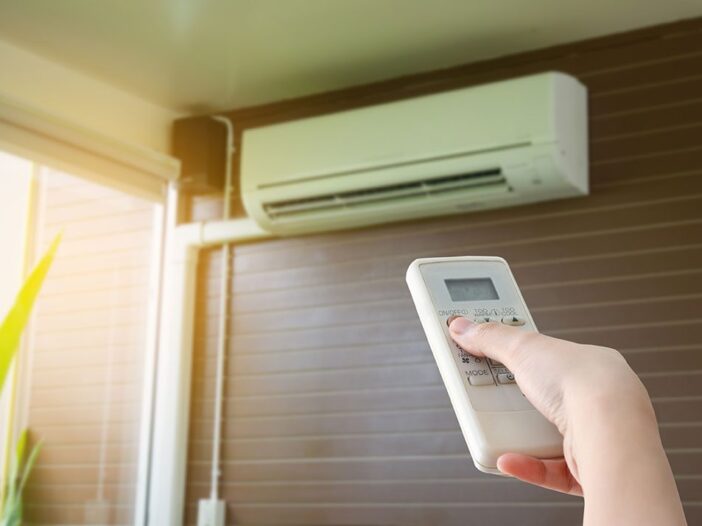
If you’re in the market for a new HVAC system, or just want to improve your home comfort, you may be wondering if a ductless system is a good choice. Ductless technology has become increasingly popular in recent years – for good reason.
They’re more energy efficient than traditional HVAC systems and they can provide customizable, targeted heating and cooling to specific areas of your home.
Below, we go over everything you want to know about ductless systems, from how they work to the different brands available on the market and how to choose the right one to suit your needs.
We’ll also discuss the cost of installation and some available rebates that can help offset the initial investment. Keep reading to find out if the benefits of ductless are a good fit for your home or business.
About Ductless HVAC
A ductless HVAC system is a heating and cooling system that doesn’t require any ductwork, hence the name “ductless.”
Instead of heating air in one space and blowing it throughout your home using a network of ducts, this kind of system connects multiple indoor air handlers to a single outdoor condenser. Each of these indoor units can be programmed to a different setting to deliver warm or cool air directly to the areas of your home that need it.
Unlike with a furnace or wood stove, heat and cool air are never generated or created with a ductless system. Heat is just moved from one place to another to either warm or cool a space.
For example, in the winter, heat is taken from the outdoors (yes, there’s still heat outside when it’s cold!) and moved into your home or office to warm it. In the summer, the process is reversed to provide cooling. Heat and moisture are taken from inside your space and moved outdoors, so your interior feels less humid and more comfortable, even on incredibly hot days.
Learn More:
How a Ductless Heating and Cooling System Works (Video)
How Long Does a Ductless Mini Split Installation Take
Ductless HVAC Facts, Myths, & More
Top Features
One of the reasons that ductless systems are so efficient is that their design prevents them from losing energy through ductwork like traditional HVAC systems do. They’re also whisper quiet, which is great for sleeping, studying, and watching television. Some other top features of ductless HVAC systems include:
- Flexible zoning. Ductless systems allow you to control the temperature of each indoor air handler individually, so you’re only heating or cooling the areas of your home or business that are being used, when they’re being used.
- Remote control operation. Most air handlers come equipped with a remote that allows you to change the settings without touching the unit. You can also download an app to your smartphone that lets you adjust the settings on your unit from your phone no matter where you’re at.
- Cleaner, quieter air. Noise and air pollution are a thing of the past when you have a ductless system. They’re super quiet and don’t put harmful toxins in the air or dust in the air, helping you to breathe easier.
Learn More:
Get a Cleaner, Healthier Home With Ductless (Podcast)
Single-Zone vs Multi-Zone Ductless Systems
Ductless vs. Window ACs & Central HVAC
The East coast is dotted with old, vintage-style homes that still use outdated heating and air conditioning equipment. It’s not out of the ordinary to see home and business owners using the baseboard heaters or wood stoves that came with the building during the winter and window ACs in the summer.
Newer buildings often have central heat and air, which is only marginally better at keeping a space comfortable. Because traditional HVAC systems use ducts to carry warm or cool air from one place to another, rooms that are far away from the furnace or outdoor condenser are rarely the same temperature as rooms that are closer. This makes it a lot more difficult to maintain a consistent temperature throughout the entirety of your space.
When compared to central and window ACs, ductless exceeds in multiple areas. including performance, energy efficiency, operating costs, noise pollution, air quality, and more. Because there’s no ductwork, these systems are also much easier to install than traditional HVAC.
Learn More:
Comparing Ductless AC To Other Forms of Cooling
Reasons to Switch to Ductless Air Conditioning This Summer
Signs Your AC May Be Harming Your Air Quality
Ductless Air Conditioning (Podcast)
Can You Use A Heat Pump For AC?
Ductless vs. Other Types of Heating
Ductless heating also performs better than other heat sources, like wood and pellet stoves and gas heat. Not only are they more energy efficient, they’re better for you.
One of the biggest differences is the lack of air pollution. Heat pumps don’t produce smoke or push around debris like a wood stove or central unit does, which can be harmful to your health. People with asthma, COPD, allergies, and other health conditions can benefit greatly from improved air quality at home or work.
Learn More:
Comparing Ductless To Other Forms of Heating
Ductless Heating Vs. Oil and Gas (Podcast)
Combining a Traditional Heating System with a Ductless System (Video)
5 Shocking Things You Didn’t Know About Natural Gas Heating
Heating with Ductless Heat Pumps
Ductless Heating and Rising Oil Prices (Podcast)
Electric Baseboard Heat Vs. Heat Pumps
5 Reasons You May Want a Heat Pump
Do Ductless Heat Pumps Work in Cold Climates?
Gas Heat? Check These Boxes Off Your List Before Winter
Ductless Applications
Ductless mini-splits are an ideal solution for heating and cooling many different types of spaces, such as sunrooms, add-on dens or bedrooms, attics, and basements. They’re a smart and energy-efficient choice for new construction or remodeling when you don’t have room for ductwork.
They’re also great for adding supplemental heat if you have an oil or gas heating system that doesn’t quite keep your home as comfortable as you’d like during the winter.
Learn More:
Where To Put Ductless HVAC In Your Home
Cost of Ductless HVAC
The cost of a ductless HVAC system varies depending on a few key factors. One is the size of the unit itself. A larger unit or one capable of higher loads will generally cost more than a smaller one.
Something else to consider is the type of unit you need. There are different types of ductless HVAC systems, each with its own set of features and benefits. Some units are designed for specific applications or they may have extra features like the ability to connect your system’s controls to a smart home app. These units will typically cost more than a standard unit.
Another factor that impacts the cost of ductless, but certainly not the last, is labor expense. You’ll need to pay an HVAC technician to come to your home to install your ductless equipment, and how much this costs can vary significantly depending on the complexity of the job and the experience level of the installer.
Learn More:
The Cost of Ductless (Podcast)
How To Calculate the Cost of Ductless HVAC For Your Home
The Cost of Installing a Ductless Heating and Cooling System
What’s The Cost Of Ductless Heating And Cooling?
Cost of Oil or Gas Heat Vs Heat Pump
7 Ways Ductless Heat Pumps Help Reduce Winter Heating Costs
Ductless Brands
There are many different brands of ductless heat pumps, each with different features and benefits. Choosing the right one to suit your needs is the first step to making sure your unit performs well and lasts a long time.
It’s important to select equipment from a reputable, trustworthy brand like Mitsubishi or Daikin. Lesser known brands can be problematic, failing to effectively heat or cool your home, and might even give out entirely after just a few years.
Choosing a quality brand makes it easier to repair, get replacement parts, and maintain over time. Many contractors don’t have experience installing or repairing cheaper brands and they may not have the parts for it.
Learn More:
Ductless Repair & Maintenance
Keeping your ductless system clean and well-maintained is important. But it’s also easy. You can clean and change filters yourself monthly or more often depending on your home environment and if you have allergies or pets. Professional deep cleaning is also available to help remove built-up dirt, grease, and debris from the innermost parts of the unit.
Learn More:
5 Common Reasons Homeowners Need AC Repair
Why Call Jones For AC Repair This Summer
Benefits of Routine AC Maintenance
The Top 7 Heating Maintenance Tips
10 Heating Maintenance Tips For Fall
Ductless Rebates
Rebates and tax credits can help lower the upfront cost of investing in a ductless heat pump. There are many different types of cost savings available and they often change from season to season. The amount of the rebate will vary depending on the type of system you purchase, and the energy efficiency of the unit.
To receive a rebate for your ductless system, you’ll need to purchase the system from a participating contractor. Some rebates may require that you install additional insulation in your home to qualify. If you qualify, your rebate or tax credit will be deducted directly from the cost of your system.
Learn More:
Ductless HVAC Rebates For NY, NJ, & PA
Ductless HVAC Tax Credits Through The Inflation Reduction Act (IRA)
Heat Pump Rebates & Tax Credits
Call Jones Services Today
Ductless HVAC systems have many advantages over other forms of heating and cooling, including improved energy efficiency, lower cost of ownership, and better air quality. To learn more or to get a quote, contact Jones Services at (845) 299-2234.
Get More Helpful Tips:
How to Optimize Your Ductless Heat Pump in the Winter
How To Use Fans To Augment Your Home AC In The Summer
Addressing Temperature Fluctuations After Remodeling

